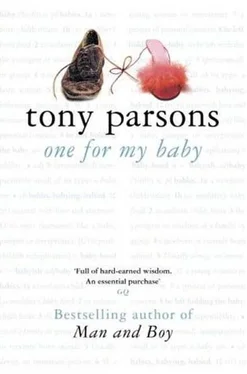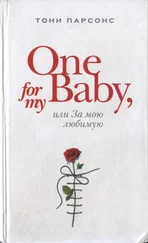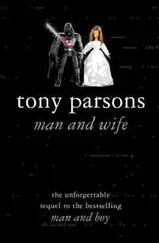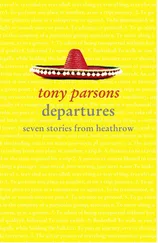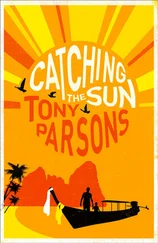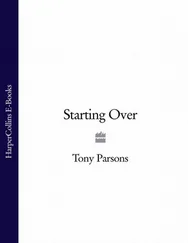But since my father went away, she is not eating very much and that frightens me. Always slim-where my dad’s life as a working journalist meant his waist size increased with every passing year, one extra pound per annum being the general rule-she is starting to look hollow-eyed and gaunt. I know that part of that is a lack of sleep because I hear her wandering around downstairs in the middle of the night as I toss and turn in my own bed, my own solitude. It is also because there are no more real family meals to prepare, because there is no more real family.
But my mum seems happy when she gets her first look at the Shanghai Dragon.
“Very nice, dear,” she says, admiring a grotesquely deformed root swimming in a jar like the outcome of some abominable scientific experiment. I now see that the dark nooks and crannies of the Shanghai Dragon are full of these roots. “Very nice indeed.”
Joyce emerges from the kitchen. She looks at my mother admiring the things in jars.
“You like?”
“Lovely!”
“You know?”
My mother squints at the jars. “It’s ginseng, isn’t it? The real thing. Not the capsules and pills that you buy in a drugstore.”
Joyce smiles, pleased with my mother. “Ginseng,” she says. “I can’t pull the sheep over your eyes. Yes, ginseng. Good for stress. When your body tired. When your body sad.”
“I could do with some of that,” my mum laughs, and I feel like hugging her.
“Please,” Joyce says, indicating the empty restaurant with an expansive gesture, asking us to choose a table.
The atmosphere in the Shanghai Dragon at six is very different from the mood at midnight. There are no drunks. Apart from my mother and me, there are not even any customers.
While we eat our Peking duck, my mum doing better with the chopsticks than I expected as we load our pancakes with spring onions, cucumber, plum sauce and duck, the Chang family are also eating their dinner at one of the tables in the takeout section. All the tables in the Shanghai Dragon have a white tablecloth apart from one. This is where the Changs eat their meals.
The entire family is there. George is spooning soup noodles from a huge bowl into six smaller bowls. He has his grandchildren next to him, the small boy on one side and the girl on the other side, both of them expertly wielding chopsticks that look far too big for them. The children’s dad, plump Harold, is noisily slurping noodles as though he has to do it within a certain time limit. His wife Doris is eating more slowly, but with her face so close to her bowl that her glasses are steaming up. Joyce barks instructions in Cantonese-at her husband, her son and his wife, and especially her two grandchildren-between checks to ensure that my mother and I are all right.
I realize how much I envy the Changs. I envy their closeness, their sense of belonging, the unbroken quality of their lives. Their completeness. Looking at them together makes me feel sad. But not really sad. It’s a kind of longing. Because I was once part of a family like that.
The Changs have dispersed by the time we pay the bill-George and Harold into the kitchen, the children and Doris to the flat upstairs. Only Joyce remains to welcome the first of the evening rush.
When we leave she pushes a brown paper bag into my mother’s hands that I know contains something to help my mum with all the things that are wrong in her broken world.
“My gift to you,” Joyce says.
What did Rose see in me? She could have had the pick of any lipless wonder in her firm’s office. Why did she choose me?
Because I’m a nice guy. That doesn’t sound like much-it sounds like the kind of thing that women say they want, just before they go off with the spunky hunk in his Maserati. But Rose wanted a nice guy. And she picked me.
It’s true. I was a nice guy. I always fell in love with the women I slept with, even when love was neither requested nor appropriate. I could never fuck around without feeling. A lot of the things that young men do without thinking were beyond me. Because I had listened to too many Sinatra records. Because I always wanted a trip to the moon on gossamer wings rather than a quick lay. Because I was looking for the one.
She saw something in me. Something that was worthy of love.
But niceness is finite. It’s like money and youth. It ebbs away when you are not looking. It leaks out of you. Look at me now. I’m nowhere near as nice as I used to be.
I don’t want to give up on life and love and all the rest of it, but I can’t help myself. It’s because life and love and all the rest of it have given me a good hiding. Life has made me feel like death warmed over.
I’ve lost my faith and I don’t know how I can ever get it back. Because I still miss someone. And because I will always miss her.
Is that okay, Rose? Is it okay to miss you?
I T IS THE DEAD PART OF THE AFTERNOON but the private members’ club is still full of soft-looking men and hard-looking women lingering over their drinks and talking about projects that will probably never happen.
Just like my father.
If you ask me, my dad’s new love is a project that will never get the green light. My old man and his girlfriend-something tells me they are going to be languishing in development hell. Just a hunch.
“You’ll come to the wedding, I hope,” he says.
I look at him, hiding behind a still mineral water in his Soho club, nervously hunting in the free bowl of Twiglets. I can’t quite tell if he is trying to provoke me or if he is completely insane.
“Whose wedding is that?”
“My wedding. My wedding to Lena.”
“Oh, did you get a divorce?”
“Not yet.”
“Did you even get a divorce lawyer?”
“Not yet.”
“Then maybe it’s a little premature to start playing ‘Here Comes the Bride’ and chucking around confetti, don’t you think? Maybe it’s a little early to start sending out the embossed invitations and ordering the cake.”
He leans forward, trying to keep this between the two of us.
“I’m just attempting to make you see that this is serious,” he says. “You act as though it’s laughable.”
“You’re mutton dressed up as ram, Dad. That’s not funny?”
“What would be funny would be if I wanted a woman my own age. But why would I want someone that looks like me?”
“Like your wife, you mean?”
“I love your mother, Alfie. Always did, always will. And I intend to take care of her.”
“All heart, aren’t you?”
“But passion dies. It does. You don’t believe me because you never got the chance to find out.”
“That’s right.”
“And I’m sorry about that, Alfie, I truly am. I loved Rose. You know that.”
It’s true. My dad loved Rose. He broke down at the funeral. Right at the end. He just fell to pieces.
“Passion fades away, Alfie. It turns into something else. Friendship. Affection. Habit. That’s enough for some people. And for other people, it will never be enough.”
I call for the bill, sick of talking to him, but he insists on paying. What a big shot.
When we are out on the street he puts a conciliatory hand on my shoulder and, although I make no move to touch him in return, I can’t help but love him. He will always be my father. I can’t imagine ever replacing him with a better model. I am stuck with him.
“I just want one more chance for happiness,” he says. “Is that so wrong?”
I watch him move off through the narrow streets of Soho, a good thirty years older than most of the people here, all sipping their designer coffee and eyeing each other up and letting the afternoon drift by, all these youngish people with time to waste, and I feel a surge of enormous pity for my father.
Читать дальше
